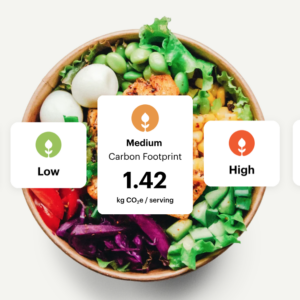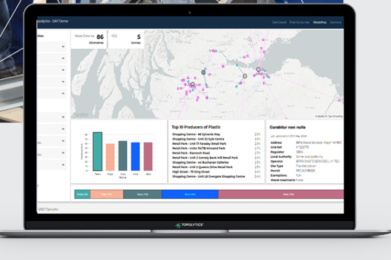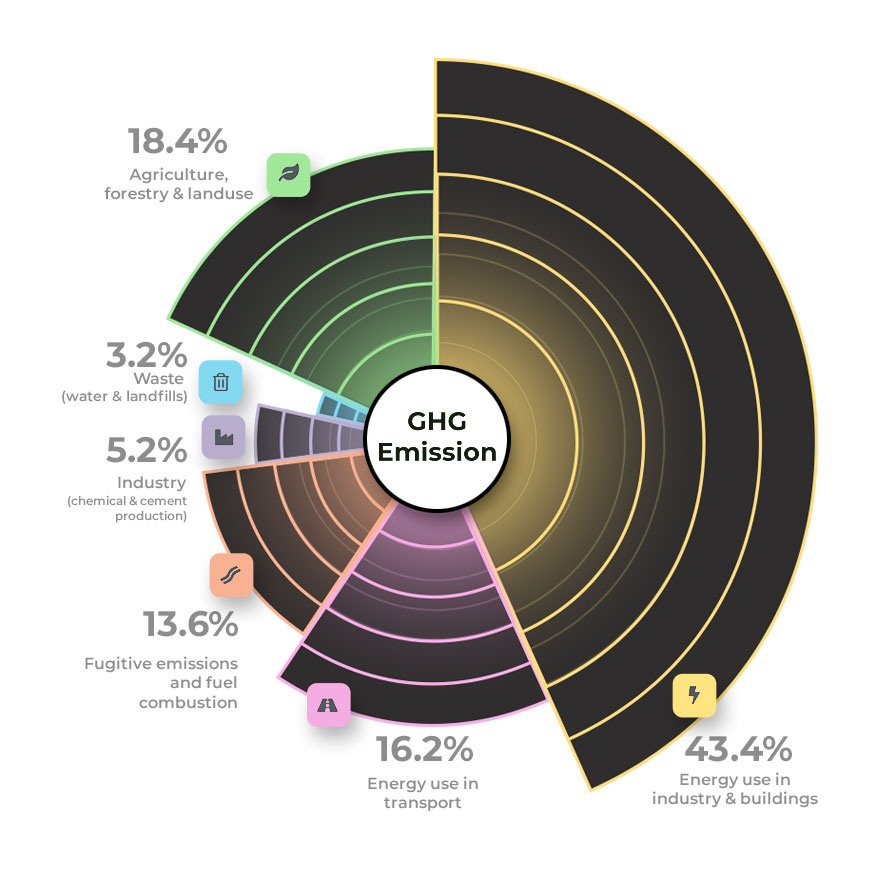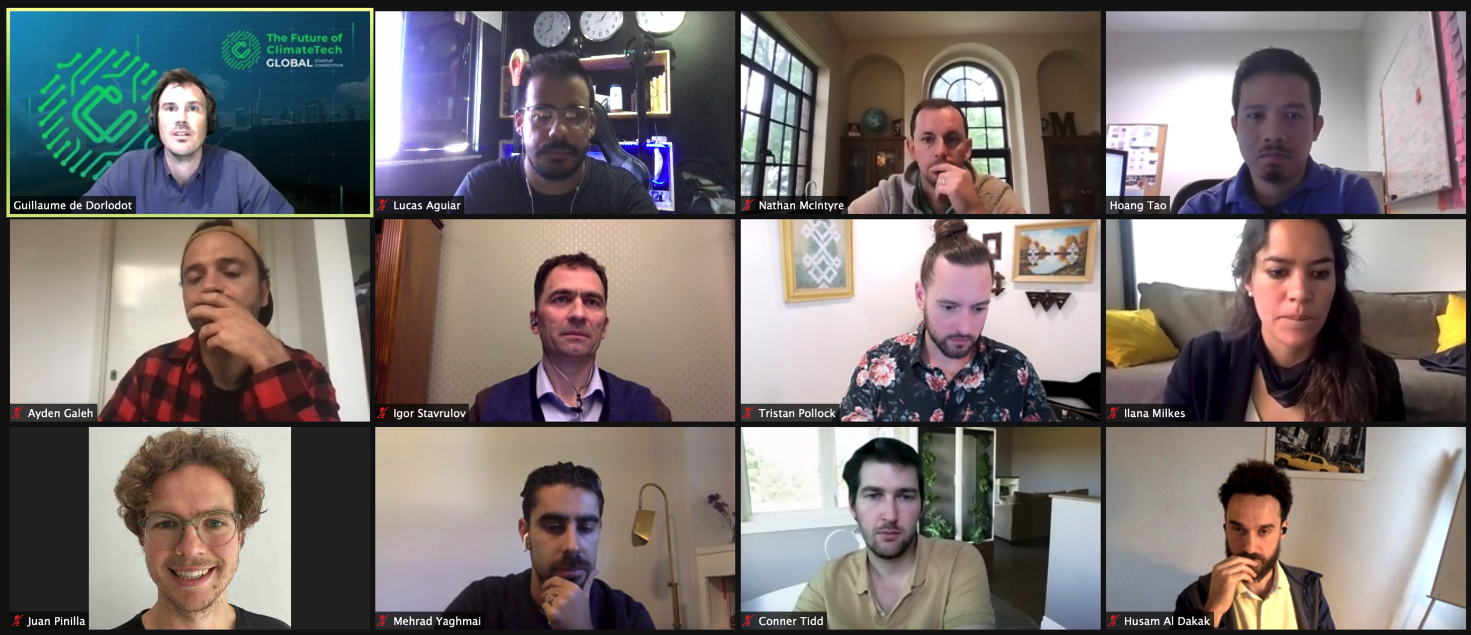December Week 1, 2023: In this weekly series, we highlight 5 climate tech startups to watch by featuring the incredible startups, companies, or projects that are leading the fight against the climate crisis.
Each month, we add these startups to our running list, which we have categorized based on fuel emission sector data from the most detailed, recent data SBC could identify from the World Resource Institute in 2016.
This initiative from Startup Basecamp aims to support founders by giving them access to networking and exposure opportunities that help them to scale and finance their climate tech solutions.
Do not hesitate to join our collective movement by requesting your membership.
With care,
Guillaume and the SBC TEAM
Energy use in Industry and Buildings
Founded: 2022 – London, UK
Founders: Josephine Bromley, Ranjeet Bhalerao and Ruggiero Guida
Elevator Pitch: Mortar IO is a virtual modelling and simulation platform to make decarbonisation retrofit planning more accurate, saving costs in implementation.
Problem they solve: Buildings are responsible for 40% of carbon emissions globally. This is more than every single car, train and plane on the planet. Considering that 80% of the buildings that will be standing in 2050 are already built, decarbonising existing buildings is the true problem to solve. Mortar IO’s breakthrough technology helps organisations understand how to achieve net zero for entire portfolios in minutes, rather than months.
Impact: Catalysing retrofits will unlock an accelerated path to net zero for every building, helping us to secure the health and happiness of our planet.
Stage: Pre-seed.
Interested in Mortar IO?
To learn more about their technology or get in touch, see here.
Cross-cutting enablers
Founded: 2019 – London, UK
Founder: Anya Doherty
Elevator Pitch: Foodsteps addresses the pressing challenge of global greenhouse gas emissions from food production, which accounts for 26% of the global total. Their platform empowers businesses to measure, understand, and effectively communicate the environmental impact of their food items, recipes, and products. With tools ranging from free software for Life Cycle Assessments to carbon rating labels for menus, Foodsteps makes it easier for companies to meet environmental targets and foster a culture of sustainability in the food sector.
Problem they solve: The food industry is a significant contributor to global greenhouse gas emissions, yet many businesses struggle to quantify and reduce the environmental impact of their products. The complexity of assessing the full lifecycle impact of food items often impedes effective action towards sustainability. Foodsteps addresses this gap by providing an intuitive platform that offers comprehensive Life Cycle Assessments, enabling businesses to gain clear insights into their environmental footprint from production to consumption (cradle to grave) and make informed decisions to reduce their impact.
Impact: Foodsteps is playing a pivotal role in reducing the environmental footprint of the food industry. By equipping businesses with the tools and data to understand and lower their greenhouse gas emissions, Foodsteps is driving the sector toward a more sustainable future. Their approach encourages the entire food supply chain – from producers to consumers – to consider the environmental impact of food, leading to more sustainable choices and practices.
Stage: Pre-seed.
Interested in Food Steps?
If you are interested in learning more, see here.
Energy use in Industry and Buildings
Founded: 2023 – San Francisco, CA, USA
Leadership: Kyle Schiller
Elevator Pitch: Marathon Fusion focus on designing, engineering, and scaling innovative technologies essential for the deployment of fusion power plants. With a mission centered on harnessing fusion as a source of clean and abundant energy, Marathon Fusion is advancing the Fusion Fuel Cycle with cutting-edge solutions like the Superpermeable Hydrogen Pump. This revolutionary technology marks a significant leap in tritium processing, offering simplicity, scalability, and efficiency, essential for the commercial viability of fusion power.
Problem they solve: The fusion power industry faces a critical challenge: the scarcity of tritium and the need for a self-sufficient, closed fuel cycle in future power plants. Existing tritium processing systems are outdated, designed for scientific-scale operations, and not suited for the scale and efficiency required for commercial fusion power plants. Marathon Fusion addresses this gap with their advanced Superpermeable Hydrogen Pump, which significantly enhances tritium processing in terms of speed, robustness, and scalability, overcoming the limitations of conventional technologies.
Impact: By resolving the technical challenges in tritium processing, Marathon Fusion is not only contributing to the feasibility of fusion power plants but also to a broader shift towards a more sustainable energy future. Their innovation in tritium processing technology can significantly reduce reliance on fossil fuels and decrease greenhouse gas emissions, making a substantial contribution to global efforts in combating climate change and promoting energy sustainability.
Stage: Pre-seed.
Want to learn more about Marathon Fusion?
To learn more about their technology or get in touch see here.
Cross-cutting enablers
Founded: 2013 – Edinburgh, UK
Founder: Michael Groves
Problem they solve: Managing and optimizing waste streams is a significant challenge in an increasingly environmentally conscious world. The lack of transparency and reliable data in waste management hampers efficient recycling and reuse, contributing to environmental degradation. Topolytics addresses this by harnessing the power of big data analytics, providing a holistic view of waste movements and patterns. This enhanced visibility enables more effective waste management strategies, helping stakeholders in the waste management ecosystem to minimize waste and maximize recycling and recovery efforts.
Impact: By improving the tracking and analysis of waste data, it facilitates smarter waste management, leading to increased recycling rates and reduced landfill usage. This contributes to the reduction of greenhouse gas emissions and conserves natural resources, aligning with the principles of the circular economy.
Stage: Seed.
Interested in Topolytics?
To learn more about this company, see here.
Energy use in Transport
Founded: 2016 – Tallinn, EST
Founder: Ivar Kruusenberg
Elevator Pitch: PowerUp is at the vanguard of clean energy solutions, offering a hydrogen fuel cell backup generator that redefines portable power. Versatile and eco-friendly, their generators are ideal for a range of applications, including yachts, boats, and recreational vehicles. Embodying a vision of a world powered entirely by renewable energy with zero CO2 emissions, PowerUp is not just a product provider but a pioneer in the cleantech industry, committed to making renewable, off-grid power a practical reality for everyday use.
Problem they solve: Traditional generators often rely on fossil fuels, contributing to CO2 emissions and noise pollution. PowerUp addresses this challenge by offering a hydrogen fuel cell backup generator, providing a clean, efficient, and quiet alternative to conventional power sources. Their solution is a leap forward in supporting a hydrogen economy, making clean energy accessible and practical for a variety of off-grid applications.
Impact: PowerUp’s hydrogen fuel cell generators represent a significant stride in reducing CO2 emissions and promoting renewable energy use. By providing a viable alternative to fossil fuel-based generators, they are helping to decrease reliance on non-renewable energy sources, thereby reducing the overall carbon footprint. Their focus on hydrogen, a clean and abundant energy carrier, aligns with global sustainability goals and advances the transition towards a hydrogen economy.
Stage: Seed.
Interested in Powerup Energy?
If you are interested in learning more, see here.
Do you know of other startups we should include in our Startups to Watch Series? Submit to our list!
How do these startups fit in with all the others we have looked at?
Check out our running list of the 400+ climate tech startups to watch we have featured.



















